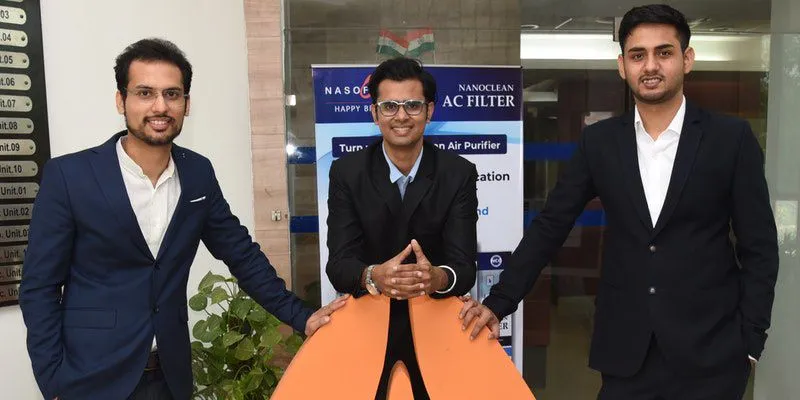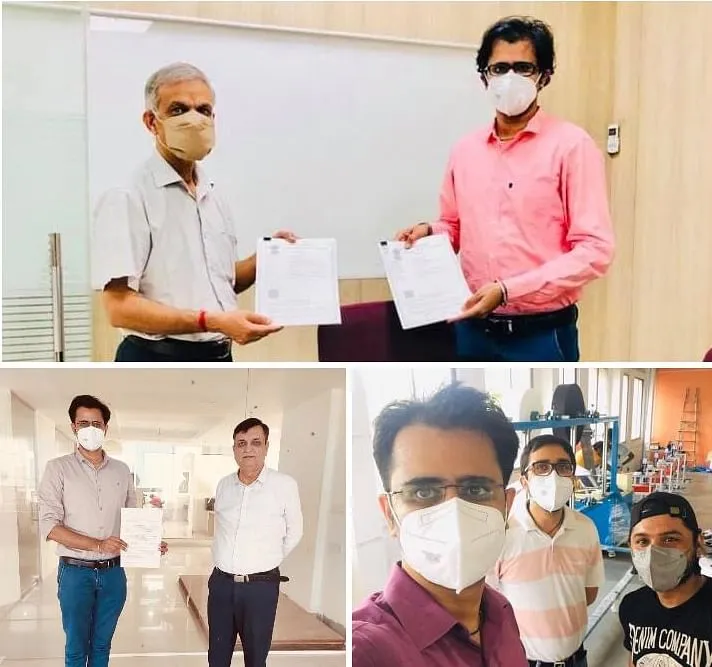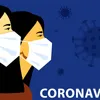Pivot and persist: How Nanoclean went from battling air pollution to taking the fight to COVID-19
Launched in 2017, Delhi-based startup Nanoclean began its journey by manufacturing nasal filters to tackle air pollution. Pivoting to face masks seemed a natural progression amidst COVID-19 and the startup has now garnered a government grant of Rs 1.3 crore.
It was business as usual for Delhi-based startup , which specialises in the development of preventive measures for polluted air, until January this year.
Nanoclean launched in the market with Nasofilter, a nasal filter that costs only Rs 10. It then came up with filters that can turn any AC into an air purifier and cost only Rs 399.
The coronavirus pandemic was an opportunity on Nanoclean’s door, and changed the course of business. The startup has now bagged grants from the government to produce genuine face masks at scale.
Launched in early 2017, Nanoclean was founded by IIT-Delhi alumni Prateek Sharma, Tushar Vyas, and Jatin Kewlani.
In 2017, it won the Startup National Award conferred by the President of India. The startup also has multiple grants on its name from the Government of India, including the Department of Science and Technology, and a joint grant with IIT-Delhi from the Ministry of Human Resource Development.

Prateek Sharma (M) with Tushar Vyas and Jatin Kewlani
Changing tack amidst COVID-19
Nanoclean sensed the impending need as the coronavirus began its march across the world.
The startup sold more than five lakh face masks, called nano masks, across the world only in February and there has been no looking back. The company, which gained attention for its nose filters, gradually started supplying masks to hospitals and frontline workers and started working with the government directly.
Prateek Sharma, Co-Founder and CEO of Nanoclean, recalls that the team lived out of the warehouse initially amidst a war-like situation.
“We are experts in providing affordable products for air pollution problems, but COVID-19 changed the market entirely. Our product Nasomask, an effective and affordable N95-grade face mask, became the need of the hour.
"We served our nation by prioritising sales to hospitals, healthcare centres, and government authorities as they were at a higher risk. We also exported lakhs of Nasomasks to countries like China, Thailand, and UAE before the export ban,” Prateek says.
Previously established processes in supply chain and teamwork helped deliver during this extreme situation, enabling the company to sell more than one million packs of Nasomasks in the last eight to nine months.
“As a result, we generated our highest monthly revenue - more than Rs 5 crore - since our inception during this pandemic,” Prateek says.
The rising demand for N95 masks in the Indian market from mid-March led to a scarcity. "We have seen every possible form of malpractice in the face mask business during this time. There was infiltration...manufacturing of ineffective fake masks, copies of branded products, and even repackaging of used masks! The root cause of everything was lack of supply,” he says.
The founders decided to continue to fuel this "need of the year", Prateek says.
Government grant and plans
The efforts resulted in Nanoclean’s latest funding to the tune of Rs 1.3 crore from the government to set up a face mask facility, which will not only produce N95-grade face masks but also specialise in manufacturing of antiviral Nasomasks that can kill and deactivate contagious viruses.
“We will be coming up with the largest Government of India-funded N95 mask production plant in Greater Noida, producing 20,000 Nasomasks per day. By March 202, we will be able to double this,” Prateek says.
He adds that the Nasomask stands out for its efficiency and quality, besides promoting the idea of Aatmanirbhar Bharat.

Fight against fake masks
Prateek says as of now there is still enough demand for facemasks in the market and the Indian manufacturing industry can grow.
"It is important to control pricing and reduce our dependence on other countries. It is easier to make a fake mask than manufacture a genuine face mask, and India needs proper labs and testing facilities to produce international quality products."
On whether masks will stay relevant once the pandemic subsides, Prateek says a decreased demand could lead to a challenge for the startup post pandemic, but the entrepreneur in him will think of this challenge as an opportunity.
“An opportunity to invent, an opportunity to learn, and an opportunity to adapt. If we master these, it is a whole new opportunity to grow,” Prateek says.
Edited by Anju Narayanan







![[The Turning Point] What led these two brothers to launch children’s brand Rabitat](https://images.yourstory.com/cs/2/70651a302d6d11e9aa979329348d4c3e/SiddharthandSumit21-1615534122986.jpg?mode=crop&crop=faces&ar=1%3A1&format=auto&w=1920&q=75)


